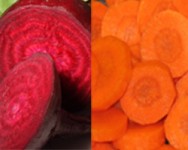Processing Beets and Carrots Advisory Meeting
Event Details
Date
December 13, 2021
Time
9:00am - 12:00pm
Location
Hybrid format: Join online or in-person
Cost
FREE!
Host
CCE Cornell Vegetable Program and Cornell AgriTech
Julie Kikkert
585-313-8912
email Julie Kikkert
Event Registration

All are invited to attend and discuss the 2021 growing season for each crop. Join us online or in-person. Cornell researchers will be on-hand to present an update on their research funded by the NYS Vegetable Research Association & Council. 2.0 DEC credits will be offered in categories 10, 1a, and 23.
AGENDA:
9:00 AM Meeting Begins
- Processor Report on the 2021 Beet and Carrot Growing Season
- Recap of Insect, Disease, and Weed Problems Encountered in Beets and Carrots in 2021 -- Julie Kikkert, CCE Cornell Vegetable Program
- Evaluating OMRI-listed Herbicides for Annual Broadleaf and Grass Management in Organic Carrot Production Systems -- Ethan Grundberg, CCE Eastern NY Commercial Horticulture Program and Lynn Sosnoskie, Cornell
- Carrot and Weed Responses to Zidua, Nortron, and Goaltender on Muck Soils -- Lynn Sosnoskie, Cornell
- Warrant and UltraBlazer Injury in Table Beets as Affected by Crop Size at Application -- Lynn Sosnoskie, Cornell and Alan Taylor, Cornell
- Impacts of Electrical Weeding on Beet Injury and Vegetation Suppression -- Lynn Sosnoskie, Cornell
- Manipulating Carrot Growth Through Plant Growth Regulators -- Sean Murphy, Cornell and Sarah Pethybridge, Cornell
- Management of Table Beet Growth and Health Through Plant Growth Regulators -- Sean Murphy, Cornell and Sarah Pethybridge, Cornell
- Update on Rhizoctonia Root Rot Research in Table Beets -- Eric Branch, Cornell
- Update on Foliar Disease Forecasting and Management in Table Beets -- Sarah Pethybridge, Cornell
- Group Discussion Period and Review Priorities -- moderated by Julie Kikkert, CCE Cornell Vegetable Program
12:00 PM DEC and CCA Credit sign-out and Meeting Adjourn
The meeting is free of charge. Pre-registration is required for both the online and in-person meeting.
COVID-19 Statement: Face coverings will be required at all times at the in-person meeting to adhere to Cornell Regional Ag Team meeting COVID-19 guidelines. We will follow all other state, local, and venue guidelines at the time of the meeting.

Upcoming Events
Orleans Regional Winter Vegetable Meeting
February 9, 2026
Albion, NY
Topics include: Breeding and evaluating tomatoes to control disease and improve yield, jar testing and ensuring spray water quality, breaking down organic matter, FSMA updates and Q&A with Ag & Markets, and industry updates. Includes hands-on learning, coffee break, and sponsor booths.
DEC credits available: 1.0 in CORE plus 0.5 in 1a, 10 or 23
African Eggplant Participatory Breeding Kick-Off
March 5, 2026
Join us to learn about the Cornell African Eggplant Research Project and learn how you can participate! African eggplant, also known as Bitterball, Garden Egg, Kittley and other names, is an important crop for many members of our community with heritage from regions such as sub-Saharan Africa, Southeast Asia, and Brazil. Since 2024, the Cornell African Eggplant Research Project has been collaborating with growers and community partners across New York to develop high-quality varieties adapted to the Northeast U.S. In this meeting, we will share information about growing and preparing African eggplant, highlight our research to date, and invite partners to collaborate with us in our 2026 participatory breeding and variety selection efforts.
COST: FREE! You must pre-register to receive the Zoom link.
Managing the Invasive Swede Midge Webinar
March 6, 2026
Swede midge is an invasive fly that causes serious economic losses to brassica crops. Due to its small size and hidden feeding habits, swede midge is often called an "invisible pest" and damage may be misdiagnosed. In this webinar, we will review the swede midge life cycle and crop damage symptoms, current management recommendations, new research findings, and highlights from on-farm case studies with a focus on organic management.
1.75 DEC pesticide recertification credits in categories 1a, 10, and 23.


































